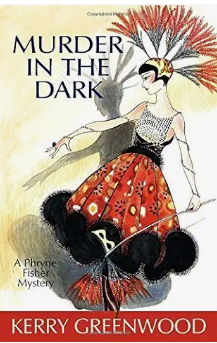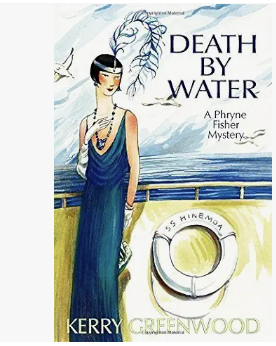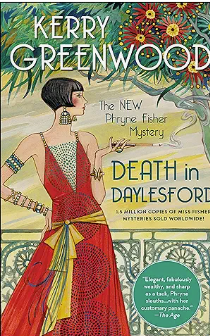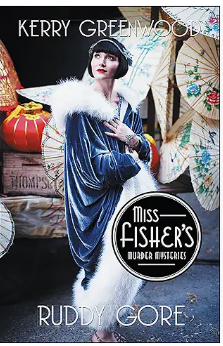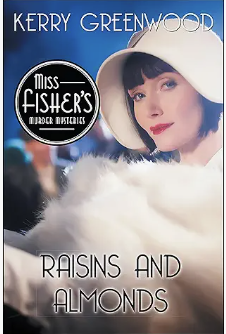INTERVIEW with KERRY GREENWOOD
“I wanted a woman strong, powerful, and independent. I wanted a heroine who did not need rescuing; and who would be a harmless wish-fulfilment dream for young women growing up in a world of misogyny and prejudice.”
Kerry Greenwood, referring to her main character in the Phryne Fisher Mysteries
The Curators of Crime had the privilege of interviewing Kerry Greenwood, author of the much-loved Phyrne Fisher novels, which are the basis for the Acorn TV show, “Miss Fishers Murder Mysteries”.
I’ve read that you’ve said you’ve created the character of Phryne Fisher as a kind of ‘female James Bond.’ Can you explain what you mean by that?
I think the point about Bond is that he was always a wish-fulfilment character. Most of the earlier works were especially ludicrous. I kept having visions of a 13yo Bond boasting about diamond-encrusted three-speed bicycles. But Bond grew in his role as the times progressed. Daniel Craig is the definitive Bond for me.
But it struck me long, long ago that there was no female equivalent. And why not? Why is there no female Saint, either?
Phryne is more Simon Templar than James Bond; but the idea is the same. I wanted a woman untroubled by the self-doubts that equally failed to assail either Bond or Templar. I wanted a woman strong, powerful, and independent. I wanted a heroine who did not need rescuing; and who would be a harmless wish-fulfilment dream for young women growing up in a world of misogyny and prejudice. Phryne is a female Bond without the product endorsements, and without the cardboard lovers. I have always preferred my lovers less flat, stale and indigestible than that.
Why did you choose to set her adventures in the 1920s ? Why not present day?
Writing in the present day is actually hard because it’s so ephemeral. Today’s obsessions are tomorrow’s vieux jeu. I have set Corinna in the floating present, but that’s become a lot harder because the times have changed so much. Writing in the past is far easier because I know a great deal about the 1920s in Australia. I wrote my legal history thesis on the waterfront strike of 1928, so it seemed an obvious time to set Phryne. But above all because my first publishers (McPhee-Gribble) wanted an historical female detective and I said yes please! so fast that it was only on the tram home I realised the enormity of that to which I had so rashly agreed.
But the 1920s were a perfect epoch in which to place a female sleuth. One third of the Western world’s young men had been slaughtered in the trenches; and so women had taken their places in so many arenas. The masculinist rump may not have been happy about this, but they had little choice other than to lump it. Women then were freer and more independent than they later became, since after WW2 they were forced back into the kitchen whether they wanted it or not. I was in earlier times accused of inscribing present day values back into the 1920s, but this is a false conception. Nothing I have said about women in the Twenties was impossible at the time.
Art or precious objects are often key elements in the books–from precious manuscripts to jewels to artifacts; and Murder in Montparnasse was about an artist. What attracts you to art and artists in mysteries?
Art has always been part of my life. I did study Fine Arts at university. Better people fight about art than matters more visceral.
How do you feel about the series’ portrayal on TV and film? How do you feel about Essie Davis’s portrayal of the character you’ve created? What kind of feedback have gotten from fans of the books?
Essie and Nathan were wonderful. As were the rest of the cast. Not only were they brilliant actors, they were also decent and charming people. It was a very happy set, and this makes an enormous difference. Sometimes fans of the books have been disappointed. What I tell them is that translating books onto film is an impossible task; but Every Cloud did a magnificent job. There were robust discussions from time to time, and everyone had to yield ground at some point. But I do not see how the series could have been bettered.
Was Cocaine Blues your debut novel? How easy was it to sell?
It was my first published novel; but the seventeenth I had written. At the time I had not heard of the Ten Thousand Hours rule, but it’s true. You cannot write novels people really want to read without a thorough apprenticeship trying your hand at different genres. I had no trouble selling it in the first instance because I had a two-book contract, and what I gave McPhee-Gribble was what they asked for. I am very grateful to them. But getting my name towards the front of the queue was a long and weary struggle. Many a time I set out on a dark winter’s night to appear at a library function. I would look around at my faithful PA, accept his encouraging nod, and survey an audience of twenty-odd hardy souls who had come out on a filthy evening to be entertained. And I did just that.
Authors are not there to lay down the law and the prophets. This might pass muster in universities, but out in the real world you are there to make a difference to people’s lives. You’re being paid to entertain, so go out there and do it. And I did. I would give different variants on the usual things: what’s my background? (Wharfie’s daughter, working-class kid made good.) What did I study at Uni? (Law/Arts) What’s my day job? (Legal Aid solicitor for the poor and underprivileged.) How do I get my ideas? (Search me! I guess they just come to me, although I like Pratchett’s little man in some godforsaken hellhole who sent him his bright ideas.) How do I get to be an author? (Work hard at it, don’t expect anything to be given you on a platter.) And so forth.
Then I would answer every question, and finish with a wonderful story to send everyone home happy and exalted. I told the tale of Toby the Shoplifting Dog many a time. And no, you’ll have to wait until my autobiography comes out for that. But the real payoff was many years ago when I found myself on the Rocks in Sydney. It was a vast pavilion with at least a thousand folks gathered therein. They had all come to listen to me. Did I wow them? Yes, apparently I did. My PA said it was my best performance ever. But I could not possibly have managed it without my long, weary apprenticeship at municipal libraries. A sporting analogy would be Grand Final Day. You are not going to excel at the Big Dance unless you’ve spent your thousands of hours on muddy nights at suburban training.
Your books also describe Phryne’s wardrobe, and her house–both of which are fabulous and really come to life in the series. What inspired you?
Twenties fashion really was something else. I love Erté, Patou, art decoratif, and art nouveau. All of which came to life wonderfully in the TV series. Every Cloud’s crew did themselves proud. For the first time in centuries, fashion was a liberating force for women. Corsets? Oh, please.
You have written a lot of books and short stories about Phryne Fisher. What are some of the challenges you face in maintaining a lengthy series? How do you keep the stories so fresh while keeping true to the character?
The biggest challenge is making sure that every book is different. After more than thirty years continuity is also a challenge. Occasionally I make a mistake, and my legion of fans always tell me about it. I don’t mind. They’re welcome, and I accept this in the spirit in which it is offered. If the canon didn’t matter to them they wouldn’t bother.
Your books promote women’s non-traditional roles– was that a purpose at the start, or did it happen as a result of the story and character?
The non-traditional roles adopted in my books were at the time a demographic necessity. With so many young men slaughtered in the War, sometimes the only person for the job was a woman. Pointing the moral becomes so much easier under these conditions.
What’s on your ‘To Be Read’ pile ? What do you like to read?
I don’t really have anything in my To Be Read file, because I’ve pretty much read everything I ever wanted to. But I am re-reading all my favourites. Terry Pratchett’s Discworld, PG Wodehouse, van Gulik’s Judge Dee books, Aaronovitch’s Rivers Of London series and so on. But I am always on the lookout for new authors, especially by women.




